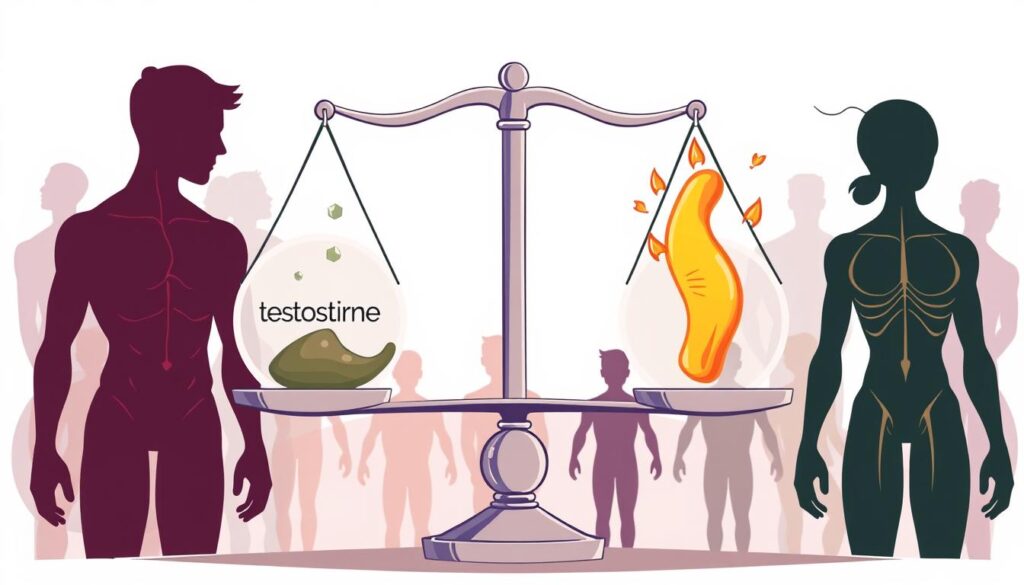As men reach their 40s and beyond, they often face a significant challenge – declining testosterone levels. This vital hormone plays a crucial role in maintaining male health, from sexual function to muscle mass and energy levels. Recognizing the signs of low testosterone, or “low T,” is the first step in taking control of your hormonal well-being. In this comprehensive guide, we’ll explore the causes, symptoms, and natural ways to boost testosterone levels, empowering you to live your best life at any age.
Testosterone, the primary male sex hormone, is responsible for a wide range of physiological and psychological functions. From maintaining muscle tone and bone density to regulating mood and sexual function, this essential hormone is crucial for overall health and well-being. Unfortunately, as men age, their testosterone levels gradually decline, often leading to a host of concerning symptoms. By understanding the causes and signs of low T, you can take proactive steps to address this issue and reclaim your vitality.
Here at DietGuru, we’re dedicated to providing men with the knowledge and tools they need to optimize their testosterone levels and improve their overall health. Through a combination of scientific research and practical expertise, we’ll guide you through the process of identifying low testosterone and implementing effective, natural strategies to boost your T-levels. Whether you’re seeking to enhance your sexual performance, build muscle, or simply feel more energized and mentally sharp, this comprehensive resource will empower you to take control of your hormone health.
Understanding Low Testosterone Over 40: Causes and Risk Factors
As men age, they often experience a gradual decline in their testosterone levels. This natural hormonal change can lead to various health concerns and impact an individual’s overall hormone health. Understanding the underlying causes and risk factors associated with low testosterone in men over 40 is crucial for addressing this common issue.
Age-Related Hormonal Changes
The primary driver of low testosterone levels in men over 40 is the natural aging process. After reaching their peak in early adulthood, most men experience a steady decline in testosterone production, often at a rate of about 1% per year. This gradual decrease can result in a significant drop in hormone health over time, leading to a range of symptoms and potential health risks.
Lifestyle Factors Affecting Testosterone Production
- Sedentary lifestyle and lack of physical activity
- Poor diet high in processed foods and low in nutrients
- Chronic stress and elevated cortisol levels
- Excessive alcohol consumption
- Obesity and excess body fat
Medical Conditions That Impact Testosterone Levels
In addition to age-related changes and lifestyle factors, certain medical conditions can also contribute to low testosterone levels in men over 40. These include:
- Testicular injury or dysfunction
- Pituitary gland disorders
- Type 2 diabetes
- Chronic inflammatory conditions
- Sleep apnea
Addressing these underlying causes and risk factors is essential for men seeking to maintain optimal hormone health and prevent the potential consequences of low testosterone as they age.

Common Symptoms and Warning Signs of Low T
As men age, it’s common to experience a gradual decline in testosterone levels. This hormonal change can manifest through various symptoms, which serve as important warning signs. One of the most noticeable effects of low testosterone is a decreased sexual health, including a diminished libido and difficulty achieving or maintaining an erection. Additionally, men with low T may face persistent fatigue, muscle loss, and mood changes, such as increased irritability or depression.
Paying attention to these symptoms of low T is crucial for men over 40. Recognizing the signs early on can enable timely intervention and management, helping to maintain overall health and well-being. By addressing the underlying hormonal imbalance, men can take proactive steps to boost their testosterone levels through lifestyle modifications, dietary changes, and potential medical treatment if necessary.
Comprehensive understanding of the common symptoms of low T empowers middle-aged men to take control of their health and seek appropriate support. By addressing low testosterone, men can improve not only their physical vitality but also their emotional and sexual health, ultimately enhancing their quality of life.










